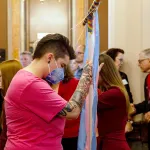Your trusted source for contextualizing LGBTQ+ and Election 2024 news. Sign up for our daily newsletter.
Former President Donald Trump has repeatedly made baseless claims that American schools are clandestinely performing gender-affirming surgeries on children.
The claims are divorced from reality: Schools are not involved in the medical decisions that families of trans youth make to receive gender-affirming care. Surgeons, or anyone who could conceivably perform such operations, do not work at grade schools, which need parental consent to give students most medical care. The Trump campaign has not provided any evidence to back up the blatantly false statements.
Although Trump didn’t bring this rhetoric to the debate stage, experts see his outlandish anti-trans comments as an attempt to shore up support after alienating parts of his base with confusing and unclear stances on restricting abortion access. The point of such bizarre anti-trans rhetoric, experts say, is that it doesn’t need to be based in reality — it just has to get people worked up.
“He’s had to do some repairing. And it’s a really easy strategy to just fall back on anti-trans rhetoric,” said Alison Gash, professor and chair of political science at the University of Oregon. It doesn’t require proof, Gash said. Republicans haven’t needed proof to make allegations that trans women athletes are taking opportunities away from cisgender women, and proof of trans people posing a threat to cisgender people wasn’t needed to pass anti-trans legislation across the country.
Gash expects to see Trump spreading more anti-trans rhetoric in the coming weeks. She expects him to reach for that rhetoric as he tries to hold on to the segments of his base who may be angry about his disavowal of Project 2025, the blueprint for a second Trump administration offered by the conservative Heritage Foundation.
Trump first baselessly accused schools of secretly performing surgeries on students at the annual Moms for Liberty summit in Washington, D.C., on August 30, in conversation with Tiffany Justice, a cofounder of the group. Leaders of Moms for Liberty, a conservative nonprofit group, have accused teachers and librarians of “grooming” children — without explaining what that means — while encouraging parents to “push back” against gender ideology.
“The transgender thing is incredible. Think of it: Your kid goes to school and comes home a few days later with an operation,” Trump said at the event. “The school decides what’s going to happen with your child. And you know, many of these childs [sic] 15 years later say, ‘What the hell happened, who did this to me?’ They say, ‘Who did this to me.’”
The former president didn’t make such a bald-faced statement in a vacuum. For years, Republican state lawmakers have worked to keep teachers from being able to affirm students questioning their gender identity and to keep LGBTQ+ subjects out of schools, while far-right pundits have accused public schools of conditioning children into becoming transgender.
Trump’s turn to anti-trans rhetoric as a political tool also follows the same playbook as 1980s Republicans propping up gay marriage, and their opposition to it, as part of their national platform — because voters were not as animated on abortion at the time, Gash said.
“He’s not just creating a narrative out of the sky, right? He is bringing us right back to the narratives that were catalyzing his campaign at the start,” said Gash, who conducts research on advocacy strategies used to advance civil rights and how trans youth are targeted in politics.
In Mosinee, Wisconsin, days before meeting Harris on the debate stage for the first time, Trump repeated the same brazen claim at a campaign rally.
“Can you imagine you’re a parent and your son leaves the house and you say, ‘Jimmy, I love you so much. Go have a good day in school.’ And your son comes back with a brutal operation. Can you even imagine this? What the hell is wrong with our country,” he said.
Kelly Dittmar, an associate professor of political science at Rutgers-Camden University and the director of research at the Center for American Women and Politics (CAWP), sees Trump repeating this claim as a desperate attempt to appeal to his base by capitalizing on some Republican voters’ concerns about gender-affirming care. But making such an outlandish claim may actually alienate the Republicans he’s trying to appeal to, she said.
“This is not rooted in reality, so it’s not clear that it would motivate those who have less extreme concerns,” Dittmar said.

As found in the third annual poll from The 19th and SurveyMonkey, just because many Americans oppose gender-affirming care for trans youth doesn’t mean they back government restrictions. Sixty percent of Americans oppose the right of transgender minors to access gender-affirming care, but 54 percent of Americans do not support lawmakers banning or restricting such care, including half of Republicans. Additionally, 70 percent of Republicans don’t think lawmakers have the knowledge to create fair policy about gender-affirming care for minors.
Hopefully, those with enough nuance in their beliefs that they don’t back blanket health care restrictions won’t be swayed by such strange claims, Dittmar said. Still, there is an inherent danger when someone in a position of power repeats easily debunked claims, she said — because with enough repetition, some people will start to believe it. And either way, trans people’s safety and lives are still being put at risk, she said.
“This is a place where he can be more overt and explicit, because he has struggled on abortion,” Dittmar said. The struggle is based on an attempt not to alienate either religious conservatives who want abortion completely banned or the majority of Americans, who support abortion access.
Trump has made confusing statements about Florida’s six-week abortion ban. It is unclear whether he would veto a national abortion ban. On the debate stage with Harris, Trump doubled down on an often repeated lie that Democrat-led states want to pass laws that permit the execution of babies after birth, which is illegal. On broader reproductive health, Trump’s call to mandate free access to in vitro fertilization has sparked confusion and outrage among some congressional Republicans and allies.
At Tuesday’s debate, Trump brought up transgender people only once. That comment marked the only moment that LGBTQ+ issues were mentioned on stage by either candidate. He made an apparent reference to a recent CNN report that found Harris in an ACLU questionnaire from 2019 expressed support for taxpayer-funded gender transition surgeries for detained immigrants. That questionnaire, provided to candidates during the 2020 presidential race, was focused on immigration during a time when the Democratic Party was more invested in being seen as a strong supporter of migrants and undocumented immigrants.
“Now she wants to do transgender operations on illegal aliens that are in prison,” Trump said at Tuesday’s debate. “This is a radical left liberal that would do this.”
GLAAD, the nation’s largest LGBTQ+ media advocacy group, noted that “a smear against transgender people that went unchallenged” was the night’s only mention of LGBTQ Americans. In a statement, GLAAD President and CEO Sarah Kate Ellis urged campaign reporters and debate moderators to ask questions that reveal candidates’ plans for LGBTQ+ Americans, so that the community is included “not simply as political talking points.”
However, to Jami Taylor, a professor of political science and public administration at the University of Toledo, it was a gift to transgender people that LGBTQ+ issues were not brought up by the moderators.
If Harris was asked a question about trans women in sports, or gender-affirming care for trans kids, Taylor sees that as an unwinnable situation for the vice president — where she has to weigh public attitudes against angering part of her coalition of voters, namely LGBTQ+ rights groups. It is crucial to trans people that Harris wins, Taylor said. To do that, keeping discussions of trans rights off the campaign trail is important, she said.
“Democrats are going to lose the election if the election becomes about bathrooms, health care for trans minors and trans people in sports,” said Taylor, who has co-edited and co-authored two books on the politics of transgender rights. “Public attitudes aren’t very favorable. At best, they’re mixed.”
Strong majorities of Americans — including most people of faith — support nondiscrimination protections for LGBTQ people, but overall support has declined, according to the latest polling from the Public Religion Research Institute (PRRI), which tracks such responses annually. In 2022 and 2023, PRRI found increases in public support for policies that require trans people to use bathrooms based on their sex assigned at birth, as GOP-led states have enacted extreme laws to do just that.
To Taylor, it is clear that Republicans want to use diverging public views on specific policies affecting transgender people to their advantage against Democrats — and for Harris, choosing to not engage on trans rights on the campaign trail is the smart move.
“If you’re a trans person, it sucks to be left out. Which, I mean, I am one,” Taylor said.
“But I think I’m politically savvy enough to know that winning the election is more important than my feelings at the moment,” she said. “The movement has to meet people where they are.”
To check your voter registration status or to get more information about registering to vote, text 19thnews to 26797.





